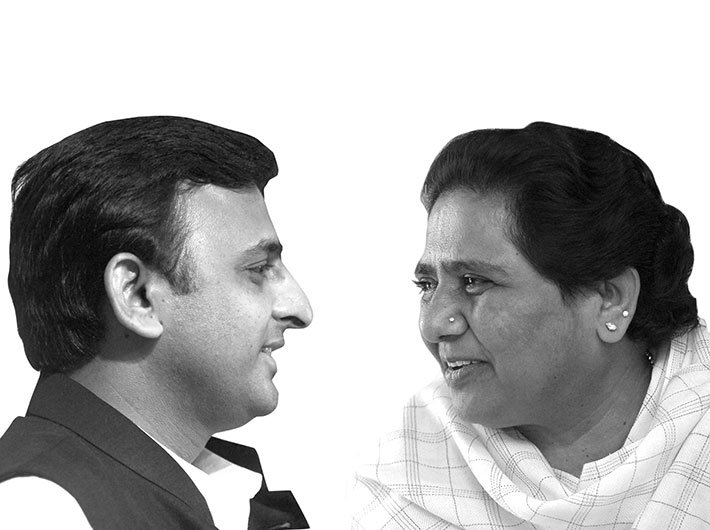Uttar Pradesh refuses to set minimum term for IAS, IPS officers, leaving the field open to erratic transfers depending on their political allegiance
On September 20, just a day before the panchayat elections in Uttar Pradesh were notified, Akhilesh Yadav government effected a major reshuffle involving over 60 IAS and IPS officers. It led to a series of comedy of errors, putting the administrative immaturity on display.
Consider, for example, what Preetinder Singh had to face. Singh, senior superintendent of police (SSP) of Noida, was transferred to Agra on the same rank. On receipt of the transfer order, Singh promptly moved to Agra to take up his new posting. But on reaching Agra, he found that the incumbent SSP, Modak Rajesh D Rao, was unwilling to relinquish charge. A confused Singh called up the DGP office and the home secretary office in Lucknow to ask what he should do. He was told to wait.
Modak, said to be close to a relative of a Samajwadi Party bigwig of Lucknow, started lobbying hard to stop his transfer. As he had got some assurance by his political godfathers, he chose not to hand over the charge to Singh. And that is how the situation remained for over two days, forcing Singh to return to Noida.
To add fuel to fire, a prominent builder of the national capital region (NCR) who has a major interest in a large chunk of land in Agra and wanted Modak to continue there to take care of his interests, also jumped in the fray to stall the transfer.
It was only when officials of the CM secretariat convinced the party bigwigs that the transfer could not be revoked as the model code of conduct had come into force and that Modak would be given another ‘good’ posting after the panchayat polls, that Singh finally got the charge of SSP, Agra. This was after a good two and a half days.
Somewhat reverse was the case of Kushinagar district where an IPS officer of 2009 batch, Atul Sharma, was posted as superintendent of police (SP). He was transferred to 15th Battalion of the Provincial Armed Constabulary (PAC) in Agra, while Shiv Prasad Upadhyay was posted in his place. One lobby of the ruling party in Kushinagar was in Sharma’s favour. But its rival faction wanted a promotee (not IPS by selection) officer to be posted there as such an officer is consider easier to ‘handle’. This started a tug-of-war between the two factions of the ruling party in the district. Hectic parleys and lobbying ended in the cancellation of Sharma’s transfer, and this was conveyed by an official order dated September 21.
Another interesting incident pertains to the former close confidant of chief minister Akhilesh Yadav, high-profile IPS officer Navneet Sikera, who has got the low-profile posting as inspector general (IG) of women helpline. In this rejig, he was given the additional charge of another low-key department of public grievance redressal. A sulking Sikera took this additional charge only after over 48 hours.
An IAS officer, principal secretary (higher education) Anil Garg, was posted as CEO of the Greater Noida authority, while another IAS officer, Deepak Aggarwal, was posted as CEO of the Yamuna Expressway industrial development authority. Soon, someone in the government realised that Garg was not the ‘right’ candidate for this post as he owed allegiance to the Bahujan Samaj Party (BSP) in the past. Within hours, he was shifted to the ‘insignificant’ post of CEO Yamuna Expressway and Aggarwal was shifted to Greater Noida as acting CEO.
Meanwhile, the state election commission (SEC) raised questions over the timing of the transfers. Additional state election commissioner JP Singh said that it had come to the notice of the SEC that IAS, IPS, PCS and PPS officers were transferred after the notification for panchayat elections was issued on September 21, 2015. Principal secretary (home) Debashish Panda has been asked to explain the transfers of IPS and PPS officers and principal secretary (appointments) Rajiv Kumar has been asked to reply on the reshuffle of IAS and PCS officers whose transfers were effected on September 22.
Musical chairs in power circles
It is evident that a majority of top administrative and police officials in the state are more than well connected to one power centre or the other, making it extremely difficult for the administration to make them fall in line. It also shows that many power centres are working simultaneously in the state, lending credence to the long-standing allegations of opposition parties that Uttar Pradesh is run not by one chief minister but by many parallel centres of power.
The transfer and posting policy of the UP government has invited criticism for many years now. The two parties which have ruled the state for the major part of the last 15-odd years are Samajwadi Party and the Bahujan Samaj Party. Each of them, when in power, has indulged in arbitrary and mass transfers of officers. There are two sets of officers in the state, one owing allegiance to the Samajwadi Party while the other section having a clear tilt in favour of the BSP. Whichever party forms the government, its blue-eyed boys get plum postings and the others are left high and dry. The latter also lie low at insignificant postings, waiting for their time to come.
Officials who have had prime postings in the earlier government know well that they will not find favour with the new government and they tend to maintain a low profile with an insignificant posting. The IAS officers not finding favour with the government are sent to the revenue board, department of languages, religious affairs department, national integration department and similar postings of lesser importance and relevance. IPS officers not in good books are posted to CB-CID, PAC, police training school, home guard or vigilance department. The lucky ones apply and leave the state on central deputation. Some even opt for long study leave.
Some senior and powerful officials of the Mayawati government had to face the music when the Samajwadi party came to power. The all-powerful principal secretary (home) and principal secretary (appointments) of the previous government, Kunwar Fateh Bahadur, was shunted to religious affairs department as principal secretary. Another favourite officer of Mayawati was the director general of police (DGP), Brij Lal. Just before the assembly elections in 2012, the election commission posted him as DG, PAC. The new Samajwadi Party government made him further irrelevant by making him director general of the Bhim Rao Ambedkar academy, Muradabad, from where he retired.
And the list of such officials does not stop here. High-profile officials in the previous government – Ravinder Singh, SP Goyal, Durga Shankar Mishra, Mohinder Singh, Anil Sant, Chandra Bhanu, Ashish Kumar Goyal, Mohammad Mustafa, Ranjan Kumar and others – were also shunted out to posts of lesser importance.
Officials in Uttar Pradesh are expected to understand the style of functioning of the government of the day and mould themselves to suit its working. It was Samajwadi Party chief Mulayam Singh Yadav who had handpicked 1978 batch IAS officer Javed Usmani as chief secretary in March 2012, when he was on deputation as the executive director with the World Bank in Washington. Right from start, Usmani was not comfortable with the coterie of some IAS officers around CM Akhilesh Yadav. In May 2014, after Samajwadi Party suffered a serious jolt in the Lok Sabha elections, Usmani, who was now not on the favoured list of officials, was removed from the post. He was kept on the waiting list and later shunted as chairman of revenue board from where he retired. Now, he is the chief information commissioner of the state information commission.
Then there is a third circle of bureaucrats in Uttar Pradesh, okay with any regime. It starts with Panna Lal Punia, a 1970 batch IAS officer. He was principal secretary to Mulayam Singh Yadav in 1993. It surprised many when Mayawati, on becoming chief minister in 1995, appointed him her principal secretary instead of handing him a punishment posting. She reposed faith in Punia by appointing him to the same post in 1997 and 2002. (It is a different matter that after retirement, Punia chose to join the Congress and went on to win the Lok Sabha elections from Barabanki in 2009. He is a member of the Rajya Sabha now.)
This trend caught the fancy of some more officers. One such example is 1988 batch IAS officer Navneet Sehgal who was supposed to be close to Mayawati in her last stint as CM. He was then not only secretary to CM but also held multiple charges of secretary (power), CMD of UP Power Corporation Limited, chairman of Jal Nigam, secretary (urban development) and secretary of the state urban development agency (SUDA). In 2012, when Akhilesh Yadav came to power, Sehgal was posted in the revenue board and later made principal secretary of the religious affairs department, both supposed to be punishment postings. But in February 2014, Sehgal was back in favour again. He was given the crucial post of principal secretary (information) by the Akhilesh Yadav government. Since then, he has never looked back.
Another official close to the previous BSP regime was Rama Raman, an IAS of 1987 batch, who held plum posts in Noida and Greater Noida. When the government changed, it was widely believed that he would be shunted to an insignificant post. But even after Akhilesh Yadav assumed office, he continued to be the CEO of Greater Noida and Yamuna Expressway industrial development authority. In January 2014, he was given the additional charge of CEO Noida – and continues to bat on a strong wicket.
No minimum tenure
Questions have been raised every now and then on the erratic transfer policy of UP government. The state government has vehemently opposed a rule for a minimum tenure of two years in a particular posting for IAS and IPS officers. The department of personnel and training (DoPT) in January 2015 notified the amendments in IAS, IPS and Indian Forest Service (IFoS) cadre rules, providing a minimum of two-year tenure in each posting. It had been a long-standing demand of bureaucrats that their arbitrary transfer, postings and suspensions by state governments must be put under check. The suspension of IAS officer Durga Shakti Nagpal in Uttar Pradesh had created much furore in 2013. Nagpal had been placed under suspension reportedly for taking on the sand mafia operating illegally in Greater Noida.
It is indeed strange that the UP government is dragging its feet on the issue of a minimum posting and hence a policy for such officials cannot be finalised. On an average, an officer serving in the state is transferred at least two to three times a year though there are certain exceptions to the rule in the form of some blue-eyed officials of the party in power.
But are politicians the only ones to be blamed for the state of affairs? Is a section of officials, who are hand in glove with the political leadership, not responsible for the sorry state of affairs? Who corrupts whom – the official corrupts the neta or the neta corrupts the official – is a question that remains to be answered.
Meanwhile, a former bureaucrat when asked why there was no transfer policy in UP, quipped, “Who says there is no policy in UP? Don’t you know that the Saifai policy exists in the state since 2012?”

